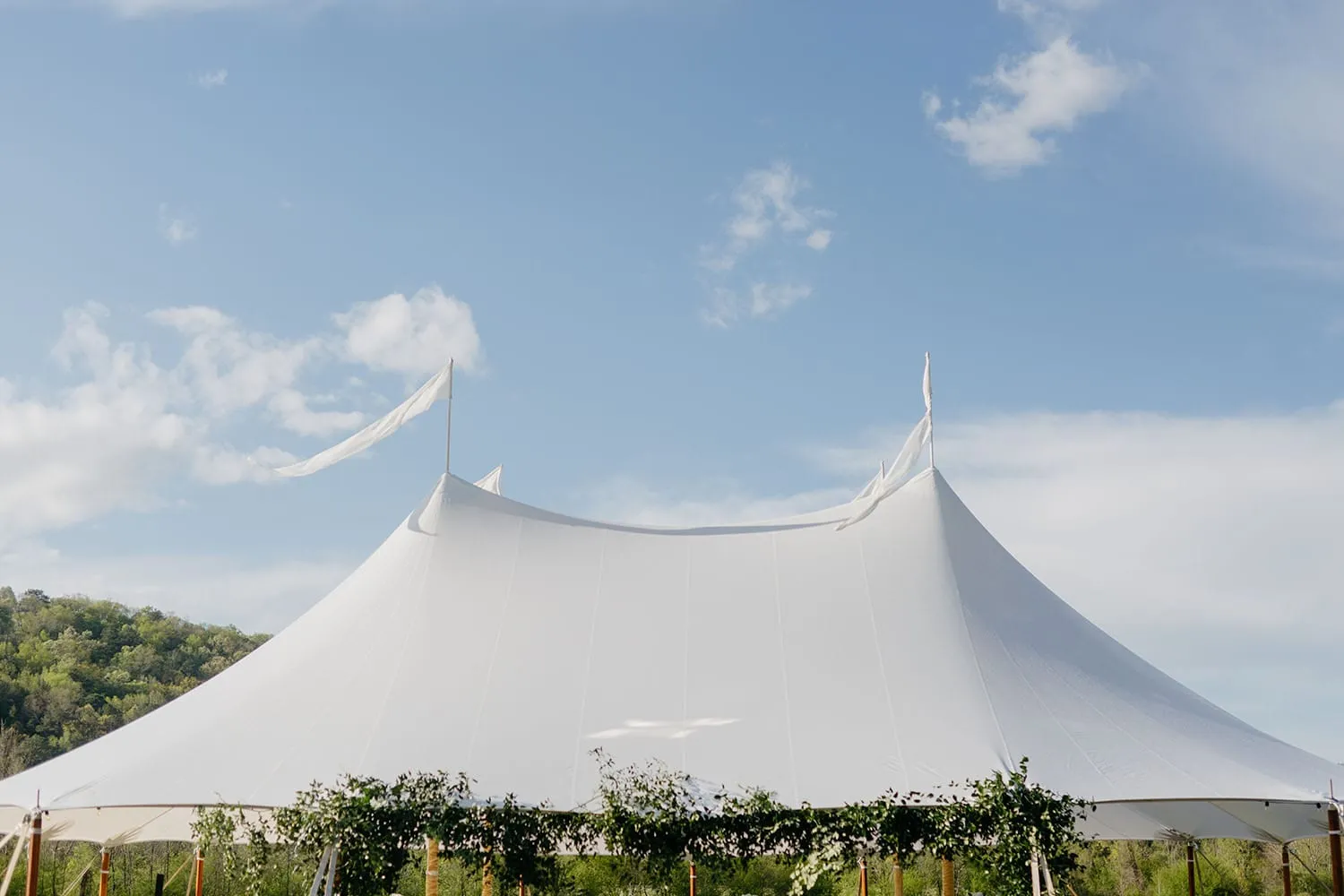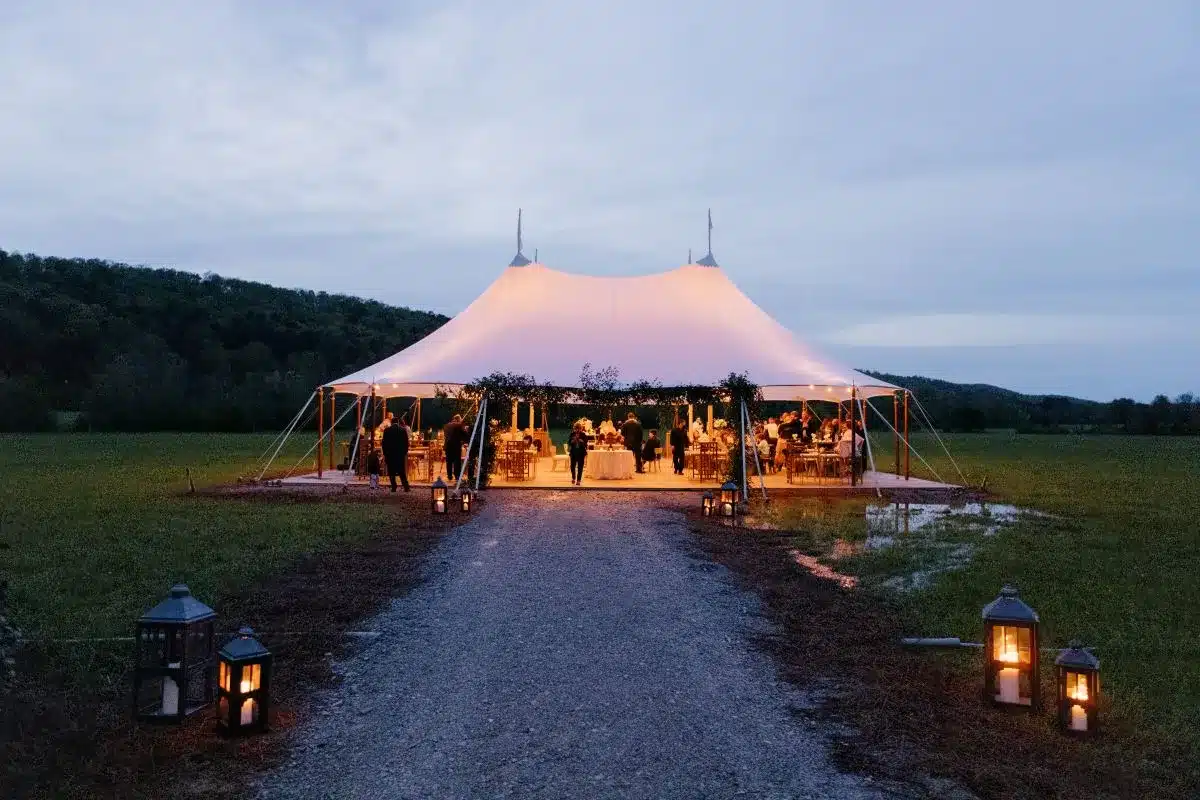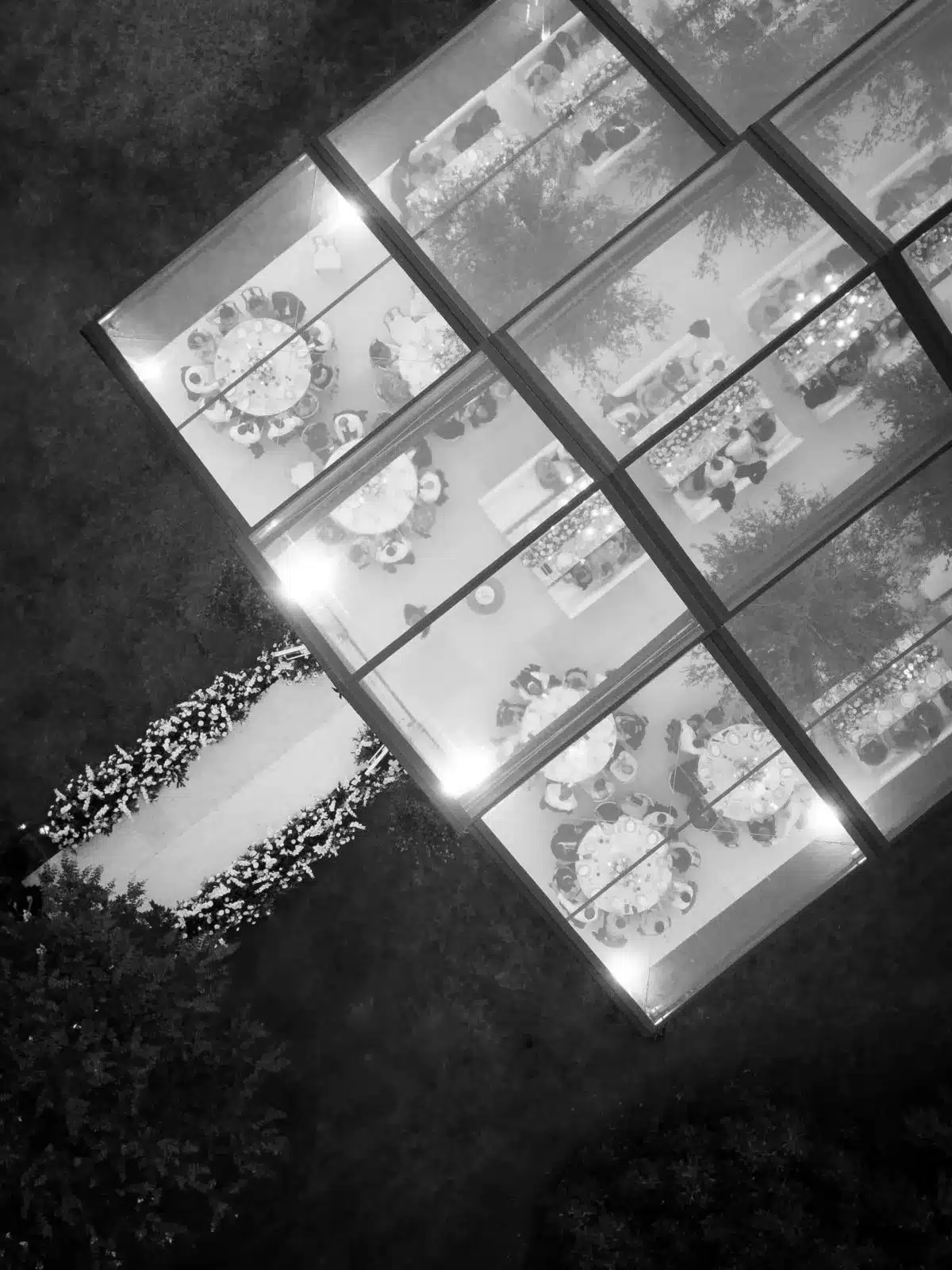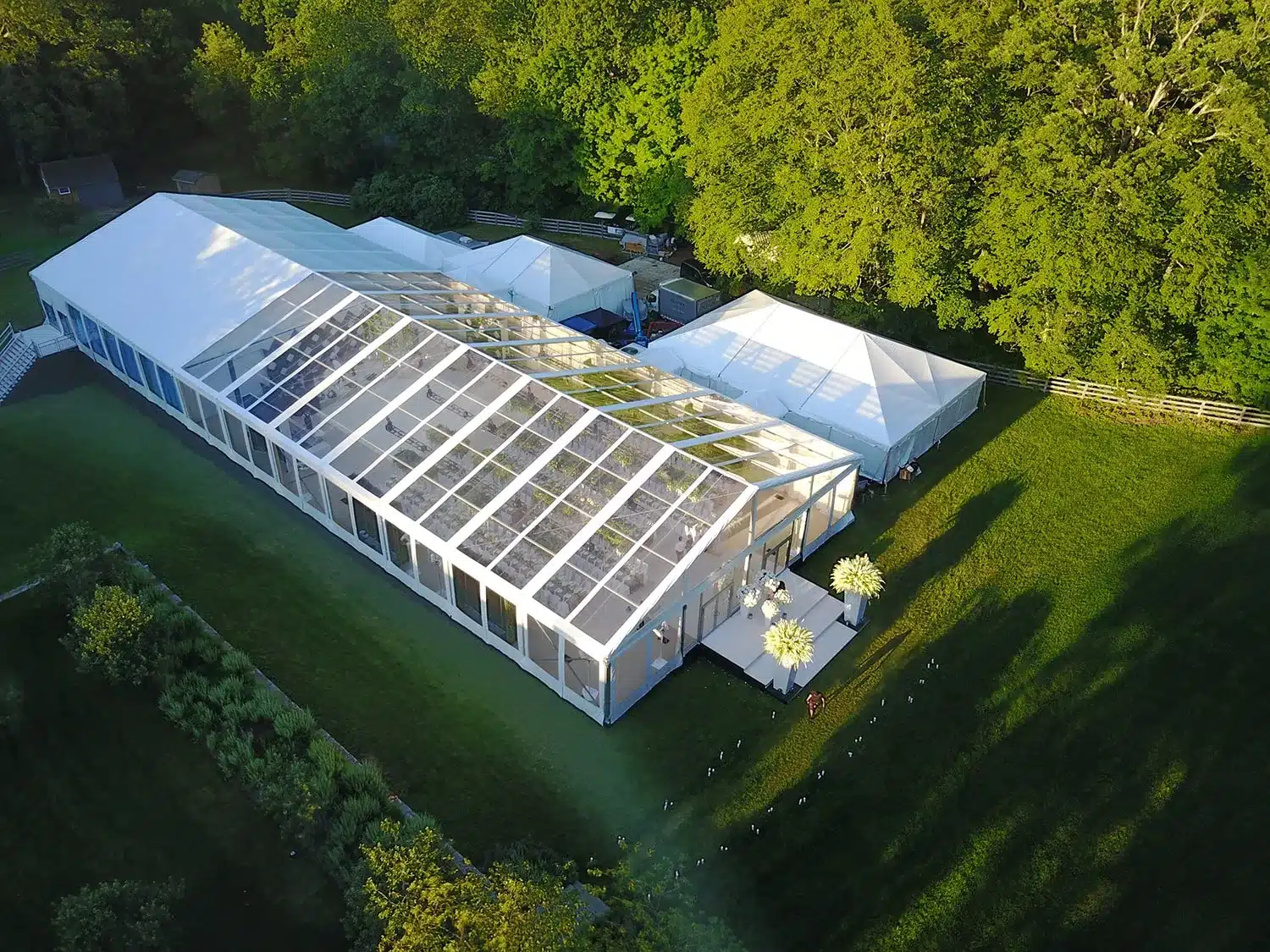Creating an unforgettable event today means balancing elegance with environmental responsibility. Luxury tent design can achieve both by integrating eco-friendly practices into every detail without sacrificing sophistication. From sustainably sourced fabrics and renewable energy systems to waste-conscious event management, these solutions elevate the guest experience while honoring the planet. Skyline Tent Company specializes in transforming outdoor celebrations into bespoke, sustainable venues that reflect your values and deliver lasting impact.
Key Takeaways
- Luxury tents can be both elegant and eco-friendly with the right design choices.
- Sustainable tent materials like organic cotton, hemp blends, and recycled fabrics reduce environmental impact.
- Renewable energy solutions such as solar panels and battery storage power lighting and climate control efficiently.
- Zero-waste practices, including composting and reusable décor, enhance both guest experience and sustainability.
- Eco-conscious design strengthens brand reputation for corporate events and adds meaning to private celebrations.
- Skyline Tent Company offers tailored, sustainable tent solutions that combine luxury with environmental responsibility.
Why Opt for Luxury Sustainable Event Tents for Your Modern Gathering?

Luxury sustainable event tents are sophisticated structures crafted from eco-engineered materials and powered by green energy, delivering both elegance and environmental responsibility. Hosts can elevate their brand image, ensure guest comfort, and achieve long-term cost savings by incorporating recycled fabrics, energy-efficient systems, and circular economy principles. These marquee solutions provide the perfect foundation for unforgettable events without compromising on sustainability.
What Are the Key Advantages of Renting Eco-Friendly Event Tents?
Eco-friendly event tent rentals boost your company’s image, offer tangible cost efficiencies, and ensure you meet evolving environmental standards through the use of renewable materials and best operational practices.
- Elevated Brand Image: Reshape audience perception by demonstrating your commitment to the environment through premium green infrastructure.
- Operational Savings: Lower expenses for energy and waste disposal by utilizing solar power integrations and reusable components.
- Regulatory Compliance: Effortlessly meet ESG reporting mandates and local environmental regulations.
These fundamental benefits pave the way for enhanced guest experiences, a reduced environmental footprint, and greater financial stability.
How Do Sustainable Event Structures Enhance Brand Reputation and Guest Experience?
Sustainable event structures bolster brand reputation by showcasing corporate responsibility, while improved indoor air quality and natural ventilation enhance guest comfort. By choosing tents with low-VOC membranes and modular designs, organizers can foster positive attendee feedback and social media buzz that reinforces a company’s green credentials. Understanding these advantages naturally leads us to explore how eco-tents actively minimize environmental impact.
In What Ways Do Sustainable Tents Reduce Environmental Footprint?
Sustainable tents lessen their environmental footprint by replacing virgin plastics with recycled fabrics, diverting waste through modular reuse, and cutting carbon emissions with on-site renewable power sources. These strategies collectively reduce the life-cycle impact of temporary structures and support circular economy objectives. Continuous efforts to reduce the footprint naturally lead to cost efficiencies that extend beyond a single event.
How Can Sustainable Luxury Tents Lead to Long-Term Cost Savings?
Long-term cost savings are achieved through durable tent materials that require fewer repairs, integrated solar and battery systems that reduce fuel expenses, and waste diversion programs that lower disposal fees. By investing in high-quality, reusable components and renewable energy, hosts benefit from ongoing returns that enhance overall event ROI. These financial efficiencies set the stage for exploring the specific materials that make such solutions possible.
What Eco-Friendly Tent Materials Are Used in Luxury Sustainable Event Tents?
Eco-friendly tent materials combine biodegradable fabrics, recycled components, and renewable framing to create structures that support both luxury aesthetics and environmental integrity. By selecting materials with proven end-of-life solutions and minimal chemical treatments, organizers can protect guest health and reduce landfill contributions. Below is a comparison of leading sustainable textiles:
These material choices inform fabric selection processes, guiding hosts to next consider the role of recyclable tent components.
Which Biodegradable Tent Fabrics Are Ideal for Luxury Events?
Biodegradable tent fabrics like organic cotton canvas and hemp-blend textiles offer a premium finish while safely decomposing after use. These textiles support controlled composting or industrial recycling, ensuring end-of-life circularity and minimizing soil and water contamination. Their natural fibers also enhance breathability and guest comfort in high-traffic settings. Moving beyond fabrics, the reuse of structural components further elevates sustainability protocols.
How Do Recycled Tent Components Contribute to Sustainability?
Recycled components—such as aluminum poles made from post-industrial scrap and connectors crafted from recycled glass plastic—reduce embodied carbon by up to 60%. By reintegrating these parts into multiple event cycles, hosts lower procurement costs and conserve raw materials. Component modularity also speeds up setup times, reducing energy consumption during installation and dismantling. These efficiencies lead us to explore alternative framing options like bamboo for an even greener footprint.
What Are the Advantages of Sustainable Framing Options Like Bamboo?
Bamboo framing offers rapid renewability, sequesters carbon as it grows, and provides structural strength comparable to steel at a significantly lower weight. Its natural aesthetics complement luxury décor while supporting local agriculture and reducing import reliance. Bamboo’s inherent anti-fungal properties also minimize the need for chemical treatments, aligning perfectly with high-end eco-design visions and prompting the integration of renewable power sources.
How Are Renewable Energy Solutions Integrated into Luxury Tent Events?

Renewable energy solutions incorporate solar panels, battery storage, and micro-inverter systems into luxury tents to power lighting, climate control, and audiovisual equipment without relying on the grid. By harnessing sunlight and storing excess energy, events can improve reliability and reduce fuel consumption and emissions. These on-site green power strategies unlock tangible benefits for both hosts and attendees.
What Are the Benefits of Solar-Powered Event Tents?
Solar-powered event tents utilize photovoltaic arrays on roof membranes to generate clean electricity for lighting, sound systems, and climate control. This system reduces generator noise and diesel fuel consumption by up to 90%, enhancing the guest experience and lowering operational costs. Solar integration also supports real-time energy monitoring for data-driven event planning.
How Does Battery Storage Support Sustainable Event Power Needs?
Battery storage systems capture surplus solar energy in lithium-ion or flow-battery modules, ensuring continuous power during periods of low light or peak demand. This buffering mechanism minimizes reliance on backup generators and stabilizes voltage fluctuations for sensitive AV equipment. Consistent power delivery facilitates seamless event operations and reinforces carbon reduction commitments.
How Can Renewable Energy Power Event Lighting and AV Systems?
Renewable energy powers event lighting and AV systems by directing stored solar electricity or wind-generated power through micro-inverters that match grid specifications. This direct feed mechanism supports LED fixtures, high-definition projectors, and audio rigs without interruption. Clean-energy-driven ambiance not only enhances guest engagement but also generates compelling sustainability narratives for brand storytelling.
What Are Best Practices for Zero-Waste Event Tent Management?
Zero-waste event tent management involves implementing recycling programs, utilizing reusable décor, and employing composting systems to divert 90% or more of venue waste from landfills. By integrating every stage of the waste stream into the planning process, hosts create circular systems that align with modern sustainability expectations. These practices form the foundation of responsible luxury event execution.
How Do Event Tent Recycling Programs Work?
Event tent recycling programs collect used tent fabrics, poles, and connectors into dedicated streams managed by specialized recycling vendors. Through color-coded collection bins and clear signage, staff sort materials during dismantling. This structured process ensures textiles are processed through mechanical recycling or composting, efficiently closing material loops and reducing site cleanup times.
What Are Examples of Reusable Tent Decor and Furnishings?
Reusable tent décor and furnishings include modular lounge setups, tables made from reclaimed wood, and drapes crafted from upcycled fabrics that can be rebranded for multiple events. These items maintain a luxurious appeal while eliminating single-use plastics and disposable signage. Rotating design collections further sustain variety without adding to landfill burden, seamlessly transitioning into composting for organic elements.
How Is Composting Implemented at Tented Events?
Composting at tented events involves directing organic waste—such as floral arrangements, biodegradable tableware, and catering scraps—to on-site or municipal composting facilities. Designated stations, clear labeling, and trained staff ensure that cross-contamination is avoided. Collected organic materials are then transformed into nutrient-rich soil amendments, supporting local agriculture and reinforcing an event’s circular economy narrative.
How Can Event Planners Create Sustainable Luxury Tent Events?
Event planners can create sustainable luxury tent events by following customized frameworks that incorporate eco-audit checklists, site assessments, and supplier partnerships focused on green sourcing. These protocols guide decisions from venue selection through dismantling, ensuring consistently responsible gatherings without sacrificing style. The following phases outline the key steps involved.
- Site Sustainability Audit: Assess energy availability, waste disposal options, and local recycling capabilities to inform tent placement and resource planning.
- Material and Vendor Vetting: Select suppliers who offer certified biodegradable fabrics, renewable energy solutions, and reusable décor options.
- Logistics and Operations Planning: Coordinate transportation, assembly, and waste management within a single, integrated schedule to minimize carbon emissions.
- Guest Engagement Strategy: Communicate sustainability initiatives through signage and digital platforms to encourage attendee participation in green efforts.
By following these phases, planners can craft memorable weddings, corporate events aligned with ESG objectives, and large-scale festivals that resonate with eco-conscious audiences.
What Are Key Steps for Eco-Friendly Wedding Tent Planning?
Eco-friendly wedding tent planning starts with selecting certified low-impact venues, biodegradable linens, and solar-powered lighting. Next, couples can incorporate plant-based menu options and compostable place settings, followed by a post-event recycling and donation program for décor and attire. These steps ensure that every romantic moment also supports environmental stewardship, setting a high standard for future celebrations.
How Do Green Corporate Events Align with ESG Goals?
Green corporate events align with ESG goals by integrating carbon tracking tools, deploying energy-efficient event infrastructure, and sourcing local, seasonal catering. Each practice contributes to measurable social and environmental performance metrics that stakeholders expect, reinforcing corporate transparency and brand trust. These protocols naturally extend to large-scale festivals and gatherings.
What Sustainable Solutions Support Eco-Conscious Festivals and Large Gatherings?
Eco-conscious festivals and large gatherings utilize modular tent clusters, shared renewable micro-grids, and comprehensive zero-waste logistics to accommodate thousands of attendees. Coordinated recycling zones, volunteer-led composting teams, and real-time sustainability dashboards create immersive green experiences that scale elegantly and leave a minimal environmental trace.
What Is Skyline Tent Company’s Commitment to Sustainability?

At Skyline Tent Company, sustainability is at the heart of our approach to luxury event design. We are committed to continually improving our practices by sourcing eco-friendly materials, investing in renewable energy solutions, and maintaining a carefully curated inventory that balances elegance with environmental responsibility. Our mission is to deliver exceptional event experiences while preserving the natural resources that make these settings so memorable.
How Does Skyline Support Sustainable Event Practices?
We actively partner with trusted sustainability leaders and adopt recognized best practices in green event management. From sourcing responsibly produced fabrics to collaborating with local vendors who share our values, every decision is guided by a commitment to reducing environmental impact while maintaining the highest standards of luxury and design.
How Do We Ensure Reliable and High-Quality Sustainable Tent Inventory?
Every tent in our collection is rigorously inspected and maintained to guarantee both performance and longevity. Eco-conscious fabrics, recycled aluminum frames, and renewable energy integrations are carefully vetted to meet strict quality standards. By consistently refreshing and rotating our inventory, we ensure that every installation reflects Skyline’s hallmark of refined design, safety, and environmental stewardship.
How Can You Request a Quote or Consultation for Sustainable Luxury Tent Rentals?
Requesting a quote or consultation for sustainable luxury tent rentals involves a straightforward inquiry process that captures your event’s scope, sustainability objectives, and customization preferences. Our team then develops a detailed proposal outlining recommended tent models, eco-materials, energy solutions, and zero-waste strategies tailored to your vision.
What Information Is Needed to Get a Customized Eco-Conscious Event Tent Solution?
To receive a custom eco-conscious tent solution, please provide your event date, estimated guest count, desired tent layout, preferred décor style, and any specific sustainability priorities, such as energy independence or waste diversion targets. This information enables precise resource planning and budget alignment.
How Do Our Tailored Solutions Meet Specific Event Needs?
Our tailored solutions are designed to match each event’s unique profile by aligning tent configurations with site conditions, specifying material choices that reflect client values, and integrating renewable energy systems to meet on-demand power requirements. This bespoke approach ensures every luxury gathering embodies both distinct aesthetics and environmental responsibility.
Conclusion
Luxury and sustainability are no longer separate goals—they can work hand in hand to create extraordinary event experiences. By choosing eco-friendly tent materials, renewable energy solutions, and waste-conscious practices, you can host celebrations that impress guests while honoring the environment. Skyline Tent Company brings together refined design, premium inventory, and a strong commitment to sustainability, ensuring every event is both memorable and responsible. With our expertise, you can confidently plan a tented event that reflects your values and exceeds expectations.

